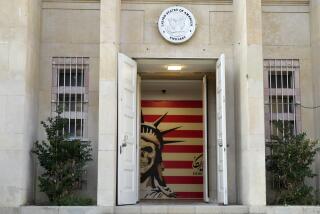Anti-U.S. Sentiment ‘Just the Policy’ : Signs of America Still Found in Tehran
TEHRAN — Giant letters spelling out “Down with U.S.A” adorn the lobby of the Hotel Azadi, formerly called the Hyatt, in Tehran.
But a visitor to the Iranian capital also sees quirky reminders of the days when Americans were a major presence here, before the 1979 revolution that replaced the U.S.-backed shah of Iran with an Islamic republic.
On Dr. Hussein Fatemi Avenue, small golden arches mark a little McDonald’s restaurant. The soda in Coca-Cola bottles is not the real thing, and when you order a Big Mac from a cashier sitting at a table, the hamburger is good and spicy but not really American-style. It costs the equivalent of $3.50.
A few blocks away, a fast-food place features “Our Fried Chicken (The Ultimate Taste),” competing with another nearby chicken restaurant that even displays Colonel Sanders’ familiar smiling face.
Unfriendly Sentry
“The Iranian people like Americans,” said a Tehran businessman encountered in a pushing mass of hundreds of people at the airport customs inspection counter.
Not all Iranians, perhaps. A sentry with a rifle at the former U.S. Embassy compound where Americans were held hostage for 444 days in 1979-81 whistles and gestures to chase away a curious visitor taking notes.
On the wall outside the compound, a sign still reads: “Center for the Publication of U.S. Espionage Den’s Documents.”
A downtown merchant, owner of a shop that sells nuts, was asked about Iranian denunciation of the United States as “The Great Satan.”
He answered in English: “That is just the policy. It is not the view of most people.”
Like everyone else interviewed in a brief visit to Tehran, he declined to give his name, saying, “If you write a true story, they will be angry with us.”
Other Iranians, after being assured that their words would not be relayed to their country’s leader or to the Islamic Revolutionary Guards, said they knew of children jailed for being found with anti-government newspapers and women imprisoned for letting strands of hair escape the shrouds on their heads.
Unlike the early years of the revolution, residents say women now are never seen on the streets of Tehran without at least a large scarf over their heads, if not the full, formless black chador.
Signs of War
Aside from slogans in bright colors on the walls, pictures of sons killed in battle displayed on car windshields and anti-aircraft emplacements on the outskirts of the city, there are few signs in Tehran of the war with Iraq.
“The war only came to Tehran in the spring and summer of 1985, when the Iraqis were bombing here,” said a British businessman who has made frequent trips to the capital for several years. “Since then it has been quiet.”
Lately, Iraq has been bombing other Iranian cities, causing heavy damage, death and injury, according to Iranian news accounts.
On television, news reports are dominated by long accounts of Iranian advances toward Basra, Iraq’s second-largest city. Between programs, viewers can sometimes watch martial images of troops on guard and tanks advancing, backed by heroic music.
Sections of Tehran often are deprived of power for hours at a time, apparently because Iraqi bombing of electric generating stations has cut production below the demand.
Citizens, again speaking on condition of anonymity, complain of shortages of such staples as cheese, soap, sugar and rice.
More to Read
Sign up for Essential California
The most important California stories and recommendations in your inbox every morning.
You may occasionally receive promotional content from the Los Angeles Times.










